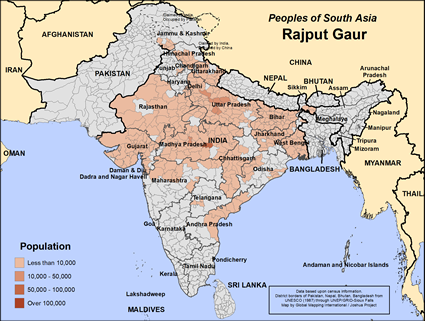Rajput Gaur in India

Photo Source:
Copyrighted © 2026
Isudas All rights reserved. Used with permission |

Map Source:
People Group data: Omid. Map geography: UNESCO / GMI. Map Design: Joshua Project.
|
| People Name: | Rajput Gaur |
| Country: | India |
| 10/40 Window: | Yes |
| Population: | 674,000 |
| World Population: | 674,000 |
| Primary Language: | Hindi |
| Primary Religion: | Hinduism |
| Christian Adherents: | 0.00 % |
| Evangelicals: | 0.00 % |
| Scripture: | Complete Bible |
| Ministry Resources: | Yes |
| Jesus Film: | Yes |
| Audio Recordings: | Yes |
| People Cluster: | South Asia Forward Caste - Rajput |
| Affinity Bloc: | South Asian Peoples |
| Progress Level: |
|
Introduction / History
The Gaur Rajputs are primarily located in northern and central India, including states like Rajasthan, Uttar Pradesh, Madhya Pradesh, Bihar, Haryana and Delhi.
Starting in the 5th century, there was a massive attack by the White Huns in what is now northern and northwestern India and Pakistan. About a century later the reigning Hindu-based Gupta Empire broke up, leaving the Subcontinent vulnerable to Muslim invaders from the north. As time went on, invaders took over land and integrated with the settled peoples of this region. Tribal leaders, especially those involved with defense, were accepted as Kshatriya, the second highest varna (major type of castes) in Hindu society, while their followers became the fourth and lowest varna. Priests became the Brahmins, the highest of the four varnas.
The Rajputs, who were part of the Kshatriya varna, became politically important in the seventh century. From around 800 Rajput dynasties ruled northern India. Petty Rajput kingdoms were the main obstacle for Muslim domination of the Hindu subcontinent. For hundreds of years Rajputs were the warriors who defended kingdoms from invaders and conquered others. Whenever possible, Rajputs settled down, became nobles, and enjoyed the lives of landed gentry.
Over a period of a couple hundred years, invaders penetrated the Rajput wall that protected the Subcontinent. Some Rajput subgroups converted to Islam during this time. The British Empire put an end to the Moghul Empire, but they recruited Rajputs into their military units. In the early 1970s, Indian Prime Minister Indira Gandhi abolished Rajput titles and property rights. The Rajputs have kept alive their proud history of conquest, bravery and military might.
What Are Their Lives Like?
They lead lives that blend their traditions with contemporary lifestyles. Traditionally known for their valor and chivalry, many Gaur Rajputs continue to uphold their customs and traditions, participating in cultural festivals and ceremonies. They are often engaged in diverse professions, ranging from agriculture and business to government service and the military. Education is highly valued, with many pursuing higher studies and professional careers in urban centers. Despite modern influences, they maintain a strong sense of community and identity, celebrating their historical legacy while adapting to the demands of modern society. The Gaur Rajputs' lives reflect a balance between preserving their historical pride and embracing the opportunities of the present.
They uphold values of bravery, honor, and loyalty, often drawing inspiration from Rajput warrior traditions and historical figures.
What Are Their Beliefs?
The beliefs of Gaur Rajputs are rooted in Hinduism, reflecting a blend of traditional Rajput customs and practices with broader Hindu religious principles. Key aspects of their beliefs include Hindu Deities. They worship a range of Hindu deities, with particular reverence for gods such as Shiva, Vishnu (especially in his forms like Krishna and Rama), and Devi (the goddess). There is a strong emphasis on honoring ancestors and lineage, with rituals and ceremonies performed to pay respects to forebears.
They celebrate Hindu festivals such as Diwali, Holi, Navratri and others with traditional rituals, prayers, and community gatherings. They visit and support Hindu temples, considering pilgrimage to sacred sites an important aspect of spiritual life.
Many Gaur Rajputs hold reverence for Hindu scriptures such as the Vedas, Puranas and epics like the Ramayana and Mahabharata, which inform their religious practices and moral teachings.
The community plays a crucial role in maintaining and passing down religious traditions and practices, fostering a sense of unity and collective identity. Overall, Gaur Rajputs adhere to a religious framework that integrates their Rajput heritage with the broader Hindu religious tradition, emphasizing devotion, morality and respect for cultural and ancestral values.
What Are Their Needs?
Hindu Gaur Rajputs are going through an identity crisis. They can no longer depend on land ownership or military careers, especially with the Indian government reserving prestigious jobs for "backward" (i.e., underprivileged) castes. Believers with the right skills can help them during this difficult time of transition.
Prayer Points
Pray the Lord will give Gaur Rajputs a spiritual hunger, then satisfy that hunger.
Pray for the Hindu Gaur Rajputs community to increasingly grow in awareness of Jesus, his life and their need for him.
Pray that these people will understand the value of becoming part of God's royal family.
Pray for a Holy Spirit led humility for all Rajput communities to fall at the feet of the King of kings.
Pray for a disciple making movement among every Rajput community.